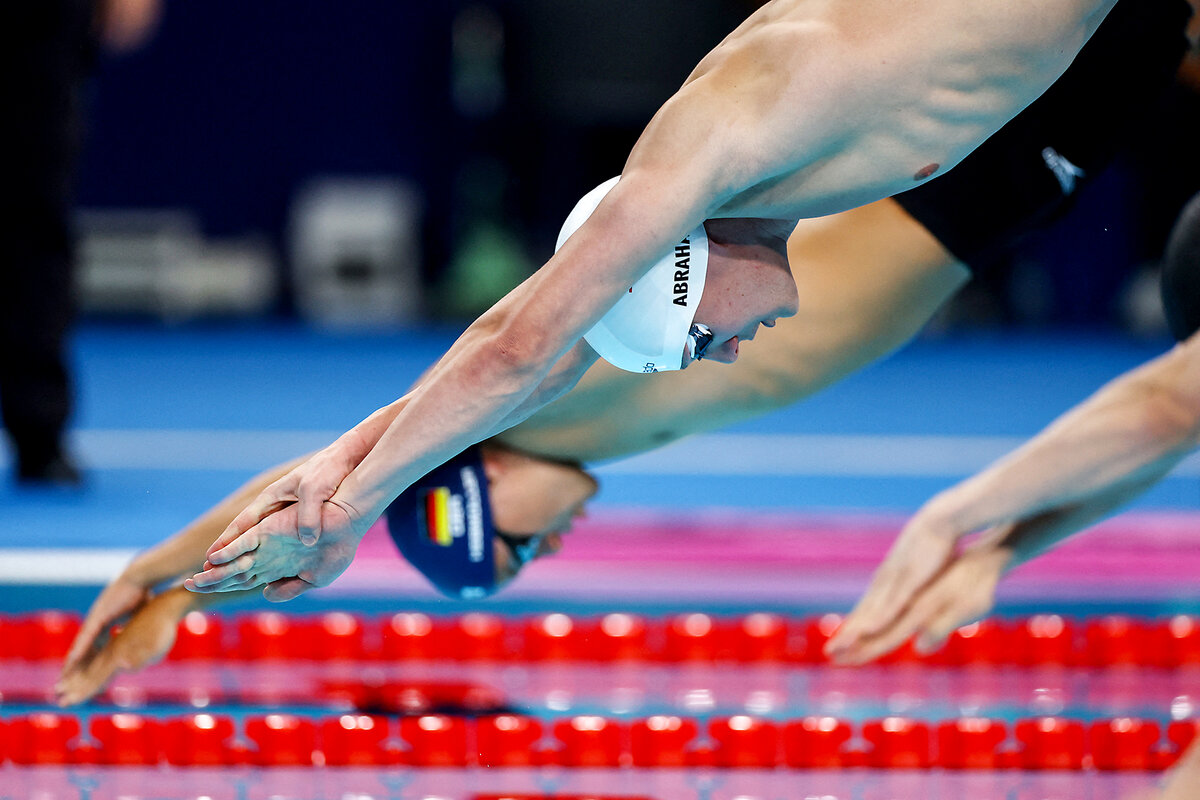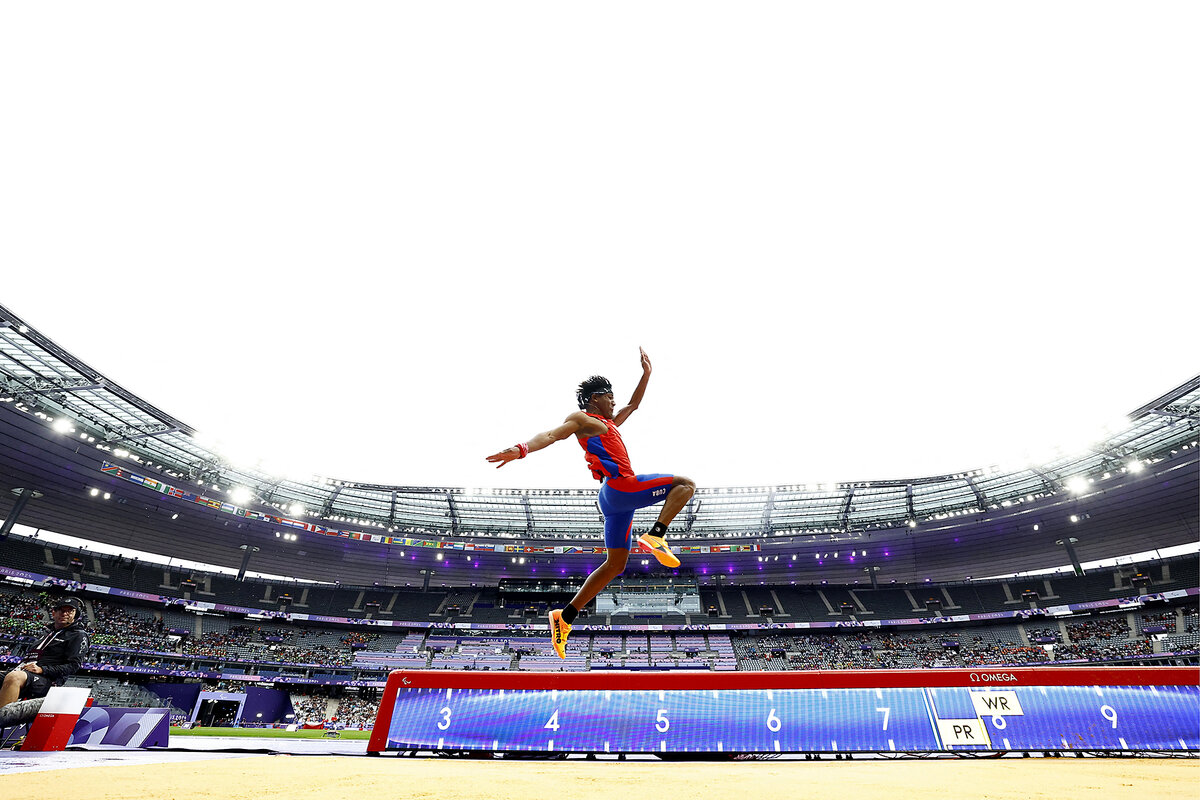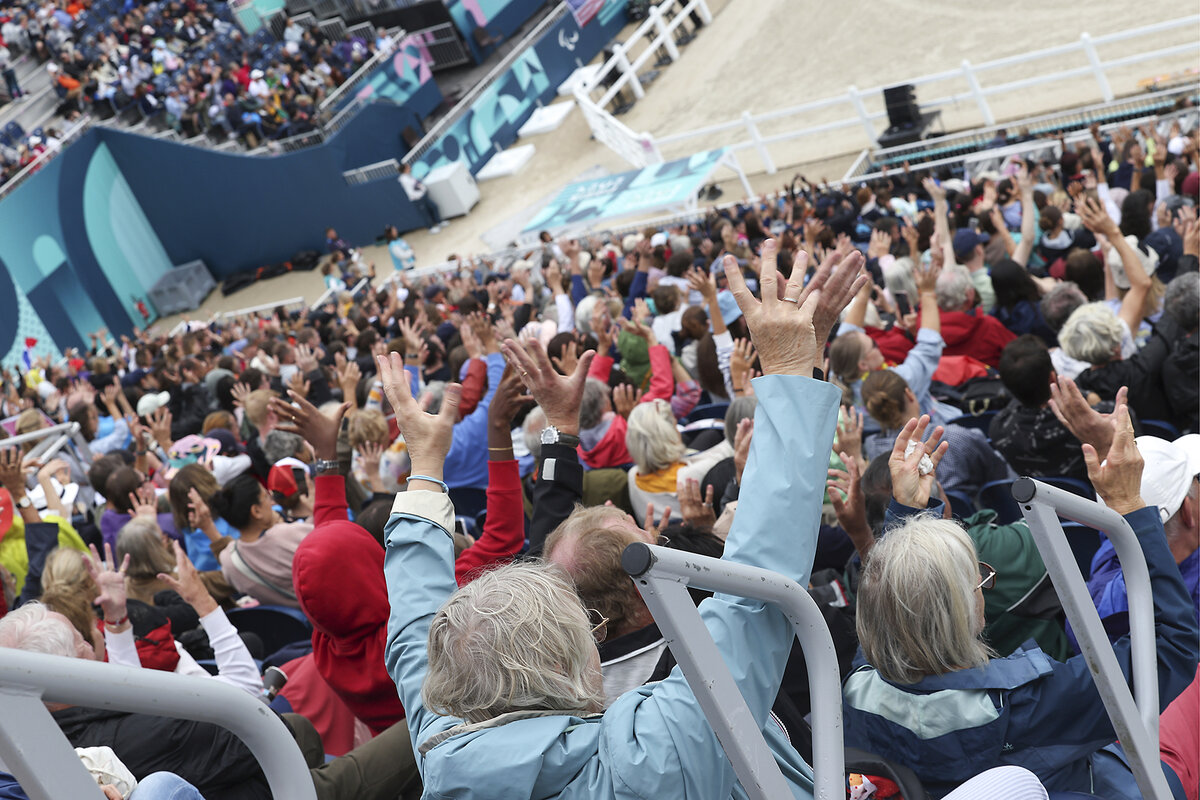Paralympic stars shrug off ãsuperheroã label. Theyãre athletes.
Loading...
| Paris
When Nadia Dadoucheãs 7-year-old son asked to go to the Paralympic Games this summer, she was pleasantly surprised. ãI thought, this is a great way to live this unique moment and participate in the celebrations,ã she says.
Ms. Dadouche had been disappointed by her failure to buy tickets for the Olympic Games; prices were too high. And even though she and her family visited the fan zones around Paris, she felt as if they were missing out on the true Olympic experience.
So she bought tickets for her family to watch wheelchair tennis and blind football. ãIt has also been a way to show my kids that there are all different kinds of people on Earth and those differences nourish us. Thereãs definitely an important message to be shared,ã she says.
Why We Wrote This
It took a while, but the French have warmed up enthusiastically to the Paralympics, buying nearly 2 million tickets. And parents are finding they offer a rare teachable moment when it comes to disability.
Enthusiasm for the Paralympic Games, which end on Sept. 8, took time to build. But ticket sales exploded after the opening ceremony for the Olympic Games on July 26, which took viewers on a virtual journey through Paris and was widely lauded by the French.
The Paralympics have now sold over 2 million tickets, half of them in the past month. Thatãs more than the Paralympic Games in Beijing in 2008, and just shy of the amount sold in London in 2012. The Education ministry has also distributed thousands of free tickets to schoolchildren so that they can watch this weekãs events.
For those who missed the Olympic Games for one reason or another, the Paralympics offer a second chance to experience the Olympic energy. They have also become a teachable moment for parents and educators to talk about living with a disability.ô
The Paralympics ãare a way to discuss disability in a more natural, less pedagogical way, while also raising consciousness,ã says Cûˋcile Viûˋnot, a Paris-based child psychologist. ãChildren can teach us something, too, because theyãre able to downplay disability without minimizing it,ã she says.
ãDisability becomes part of the scene but not the focus, which should ultimately be to watch sports, support athletes, and experience that Olympic fervor.ãô
ãItãs now or neverã to attend the Games
The return of the Olympic Games to Paris, 100 years after the city last played host, has been a source of pride and excitement for most French people, even though many had viewed the impending event with dread. Last March, a poll found that 47% of Parisians planned to leave their city during the Games, citing price hikes, overcrowded streets, and general disinterest.
But the opening ceremony, as well as French Olympic success stories like swimmer Lûˋon Marchand, brought renewed enthusiasm for the Games.
ãMany French people regretted leaving Paris during the Olympics and are looking to the Paralympics like, ãItãs now or never,ãã saysô ûric Monnin, the director of the Centre for Higher Studies and Research into the Olympicsô and vice president of Olympism at the University of Franche-Comtûˋ in BesanûÏon, France.ô ãThey want to experience this energy, the celebratory atmosphere.ã
And with Paralympics tickets starting at 15 euros ($17), the events are much more affordable than during the Olympics, when tickets could cost hundreds of euros.
Parisian Florie Ternoy says she and her family stayed in the city during the Olympics but never got the chance to see any live events ã she couldnãt afford to, and she wasnãt interested in any particular sport. But before long, she found herself getting into the Olympic spirit, turning on the television to show her 3- and 5-year-olds various sporting events, and visiting the France Hospitality House, a fan zone.
Last week, she took her kids to see the Olympic cauldron, still burning at the Tuileries Garden near the Louvre Museum, and went to watch Paralympic track and field at the Stade de France.
ãIt was important for us to show our kids values like the ability to push yourself to the limits, that a disability doesnãt stop you from being successful,ã says Ms. Ternoy. ãWe also just wanted to show them what itãs like to go to a big, noisy stadium and cheer along with everyone else, to create memories. This experience has helped us Parisians reclaim our city and feel proud to be French.ã
Paralympic athletes donãt want to be ãsuperheroesã
Parents arenãt the only ones driving increased interest in the Paralympics. Since the beginning of last year, French teachers have joined a nationwide operation called ãMy class at the Olympics,ã running activities that teach the importance of sports in daily life, accessibility, understanding disability, and inclusion. The French Education ministry also distributed over 190,000 free Paralympics tickets to schoolchildren.
Some ã15% of people around the world live with a disability, and anyone can experience disability or mobility problems at any point in their lives,ã says Pierre Rabadan, deputy mayor of Paris, in charge of sports, the Olympic Games, and the Paralympics. ãThe Paralympics have been a great opportunity for teachers to talk to students about disability and hopefully change viewpoints. Seeing the events in person brings it all to life.ã
Part of the learning curve for adults, however, has been finding the right words to talk about disability during the course of the Games. Star judoka Teddy Riner found himself in the midst of controversy mid-August when he referred to high-profile Paralympians as ãsuperheroesã and ãAvengers.ã
Those comments were not well-received byô Paralympians such as French wheelchair basketball player Sofyane Mehiaoui, who wrote on his Instagram account, ãWe are people with disabilities and we want to be considered normal people. We are not superheroes, we are athletes.ã
That may not be too hard for the younger generation to grasp. Ms. Dadouche says that her children asked very few questions about the playersã disabilities. ãIt was interesting to see that they noticed the differences, but thatãs it,ã she says. ãThey were just excited to lift their arms in the air and cheer at the top of their lungs.ãô








